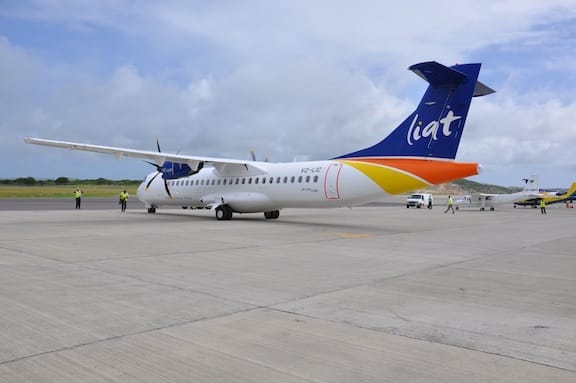
Describing travel as being in a “free fall” and the airline industry as being “bare bones” due to the impact of coronavirus (COVID-19), the trade association for the world’s airlines is advising Caribbean governments to cut passenger taxes if they wish to be competitive when service is restored.
Peter Cerda, the regional vice president for the Americas at the International Air Transport Association (IATA), says the state of the global airline sector, including carriers in the Caribbean, is “as bad as one could expect”, and they will need government support to resume any form of service.
Cerda, speaking on this week’s Caribbean Tourism Organization (CTO) podcast, COVID-19: The Unwanted Visitor, warns that the aviation sector will emerge from the crisis with fewer carriers offering leaner services to fewer routes and flying smaller aircraft. And “when it comes to the Caribbean, it won’t be the same market”.
Therefore, he says, regional governments must prepare for this eventuality by taking the necessary steps to reduce the cost of air travel.
“Governments can … help the international carriers continue to operate there [by] lowering passenger fees and taxation fees,” Cerda suggests. “One of the biggest problems that we’ve always faced in Caribbean is the Caribbean is a very highly taxed market. And it’s always taxed on the airline side, on the passenger, consumer side. And this will be a big challenge for the Caribbean once we are able to escape from this crisis.”
The IATA executive predicts that in the early stages of the resumption of air travel the people who fly would rather remain close to home. He says the Caribbean’s proximity to the United States and Canada gives it an advantage in this case, but it can quickly lose this advantage if the countries fail to be prudent.
“Because of the financial crisis that will follow the apprehensions that the consumer has, if the Caribbean does not position itself – that it is competitive, it has a good level of service in terms of medical services, it has the right procedures being implemented – these passengers may decide to go somewhere else, somewhere else in Central America, Mexico or even see in the US,” Cerda says.
IATA represents about 290 airlines or 82 per cent of total air traffic, and Certa says with virtually all aircraft grounded and airlines continuing to face financial ruin, the organisation has asked all governments, including those in the Caribbean, to, among other measures, provide low interest loans through their lending institutions.
He says many have already stepped forward to provide assistances and warns that those who do not will be at the end of the queue for service when flights resume.
“Those countries that are helping the industry will position themselves in a much better way when the crisis is over to reinstitute flights. In those countries where they are not helping their airlines, those airlines are going to be in a very difficult situation to be able to restart,” Cerda says.
While predicting that international travel will return to the Caribbean by next month, Cerda says Caribbean economies could lose US$740 million and face 23,000 job cuts if borders remain closed through to the end of June. When all of travel and tourism is considered, he says, the cost to the region could reach US$6.5 billion, with over 350,000 jobs at risk.
Advertise with the mоѕt vіѕіtеd nеwѕ ѕіtе іn Antigua!
We offer fully customizable and flexible digital marketing packages.
Contact us at [email protected]

















Rolls eyes. Passengers have been begging and begging from as far back as I can remember…..will never happen.
So let me get this right. The IATA is asking Caribbean governments to cut their tax (a major source of their revenue) IN ADDITION to providing the airlines (many of whom’s value is more than the sum of the entire Eastern Caribbean’s GDP) with low interest loans (though the wording comes across as bribery). How does the economics of this work exactly? How would this be a better situation that no airfare? I am all for cutting Airport Taxes but this is the most strong-handed, misguided advise I’ve ever read.
The taxes are too high. It would be more beneficial to reduce the taxes on airline tickets. Doing so would benefit the Caribbean by having more visitors. In other words, you can generate the same level of taxation with larger number of visitors but with reasonable tax.
Dadlian sounds foolish. You must have learnt your economics on Redonda.
Dear Jesus I thought I was the only one who thought he learnt this in his friend ‘yard’. Geez
The government’s refuse to understand by lowering the the taxes their will increase more airlift.. but no we want to pay stoosh
Reduce the taxes and all LIAT employees take a 15% pay cut and 20% for upper management. No regional governments are going to have any money right now to invest in LIAT so a pay cut has to be implemented. Better to take a pay cut than to risk redundancy if routes are cut. Just my 2 cents.
I agree with IATA in that the region needs to do something, it cannot be business as usual. They may have made some recommendations but CARICOM need to think long term and institute measures toward recovery and sustenances.
COVID19 has bought the aviation industry to a hault and every country that regional carriers fly to must contribute and do their part for airlines to stay a float.
Customer confidence is one thing but a reasonably priced ticket to our favorite Caribbean country can be enticing.
Airfares are too high. The cheapest way from UK to Dominica in March was via Paris and Martinique – avoiding landing in Antigua or Barbados and avoiding an internal flight.
Comments are closed.